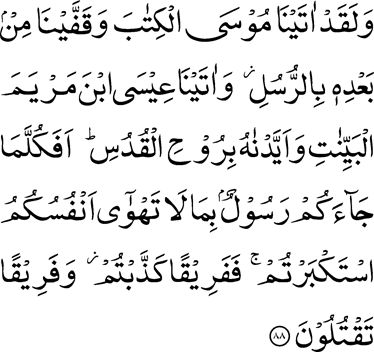Augustus
…
Hi
I was wondering if any Arabic speakers can help me. I noticed in 2:87 it talks about the Holy Spirit.
And We gave to Moses the Book, and after him sent succeeding Messengers; and We gave Jesus son of Mary the clear signs, and confirmed him with the Holy Spirit; and whensoever there came to you a Messenger with that your souls had not desire for, did you become arrogant, and some cry lies to, and some slay?
What is the Arabic phrase that translates to this? How is it used in other contexts outside of the Quran? Is the Arabic word the same as would be used for the Holy Spirit in trinitarian theology or is it different?
Thanks for any assistance
I was wondering if any Arabic speakers can help me. I noticed in 2:87 it talks about the Holy Spirit.
And We gave to Moses the Book, and after him sent succeeding Messengers; and We gave Jesus son of Mary the clear signs, and confirmed him with the Holy Spirit; and whensoever there came to you a Messenger with that your souls had not desire for, did you become arrogant, and some cry lies to, and some slay?
What is the Arabic phrase that translates to this? How is it used in other contexts outside of the Quran? Is the Arabic word the same as would be used for the Holy Spirit in trinitarian theology or is it different?
Thanks for any assistance

